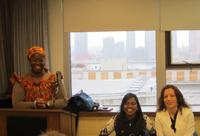INTERNATIONAL: YWCAs Advocate Global Implementation of UNSCR 1325
On March 1, 2012 at the UN Commission on the Status of Women meeting in New York, the World YWCA hosted a panel event on UN Security Council Resolution 1325 and also contributed to a panel hosted by Women's Alliance for a Democratic Iraq entitled “Rural women are vital to post conflict reconstruction”.

Speaking at the World YWCA panel event, young women leaders from the YWCAs of Sri Lanka, Palestine, and Fiji and the Director of Peace Women identified obstacles and recommended actions to achieve the full implementation of UN Security Council Resolution 1325 (UNSCR 1325).
According to Peace Women, “UNSCR 1325 marked the first time the Security Council addressed the disproportionate and unique impact of armed conflict on women; recognised the under-valued and under-utilised contributions women make to conflict prevention, peacekeeping, conflict resolution and peace-building. It also stressed the importance of women's equal and full participation as active agents in peace and security.”
Sara Arumugam of the YWCA of Sri Lanka, briefly outlined the history of the ethnic conflict in Sri Lanka and its devastating impact on women and children. During the conflict, at camps set up for the internally displaced persons, there was a severe shortage of sanitary facilities and a lack of security to protect women from sexual violence. The war also left a large number of war widows, many of whom were very young. Faced with extreme poverty, many women have turned to commercial sex since they had no job skills or training. This also put them at risk for HIV and AIDS. Still others have become community leaders, she noted.
Representing the YWCA of Palestine, Arda Aghazarian spoke about her gradual recognition that as a Palestinian, her very life is politicized. Constantly confronted by the difficult conditions imposed by the Israeli occupation, she said that, “Palestinian women face two oppressions: the violence and brutality of the occupation and the oppression from men in their own society.” Cynicisms about politics are a by-product of the worsening conditions for Palestinians and innumerable UNSCR that have never been enforced. However, she has found that UNSCR 1325 presented a new opportunity for women to talk to each other about their situations and this has led to new hope.
“We need to call for the full participation of rural women in all decision making on peace and security issues,” said Sharon Bhagwan-Rolls, Co-chair of the Pacific Working Group for a Regional Action Plan on Women, Peace and Security, adding that, “UNSCR 1325 is about people's security.” Climate change and the resulting extreme weather events are growing threats to human security, she said. She also described a regional radio project focused on UNSCR 1325 involving rural women and young women that empowered them as producers and broadcasters.
The Director of Peace Women Maria Butler said that, “There is still a big gap between international policies and their implementation at the national level.” Her organisation monitors the decisions of the Security Council from a gender perspective. Maria Butler also explained that there are now five resolutions on women and security, with UNSCR 1325 being considered the “mother”.
Panel on Rural women are vital to post conflict reconstruction
The second panel, hosted by Women's Alliance for a Democratic Iraq was entitled “Rural women are vital to post conflict reconstruction”. It sought to illustrate the necessity of gender equality in the development of communities in post conflict situations.
Magda López Cárdenas, from the YWCA of Colombia, discussed the human rights situation for rural women in her country, noting that Colombia is still in conflict. She reflected that the war has created direct threats to the civil population. Many of these risks impact women in particular, including displacement, sexual harassment, and rape. She noted the particular crisis in respect to the many young widows the conflict has created. Magda López Cárdenas stressed the need of a cultural transformation of social rights for women and a recognition of their land rights for peace.
Tania Chapata from the YWCA of Zimbabwe discussed the issues facing rural women in Zimbabwe today. She noted that rural unemployment of young women is as high as 80% in some places. Tania Chapata also made recommendations for ways to ensure women's rights in conflict and post conflict situations. She included the need for quality education, sexual and reproductive health and rights, and economic empowerment as three keys to women being able to claim their rights. She also raised the need to build advocacy skills and leadership of young women so they could reduce their dependency on men and become empowered.
One theme that permeated throughout the panel was that nations in conflict cannot achieve peace without granting women their rights. Anne Marie Goers, representing UN Women, spoke on the panel about the need for women to play a role in post conflict resolution, because women are key actors in the development of communities. There is a need for more women's lobbying and for women to hold their own governments and governments of the world accountable in post conflict situations. Perhaps this all could be achieved if, as Magda said, women of the world spoke through a “universal language of solidarity”.
PeaceWomen.org is a project of the Women's International League of Peace and Freedom, United Nations Office.
Fair Use Notice: This page contains copyrighted material the use of which has not been specifically authorized by the copyright owner.
PeaceWomen.org distributes this material without profit to those who have expressed a prior interest in receiving the included information for research and educational purposes.
We believe this constitutes a fair use of any such copyrighted material as provided for in 17 U.S.C § 107.
